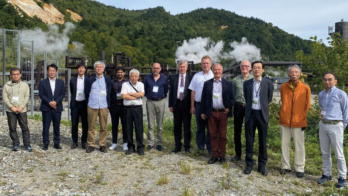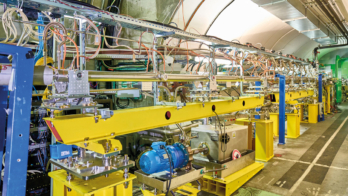
The Japanese government has put on hold a decision about hosting the International Linear Collider (ILC), to the disappointment of many hoping for clarity ahead of the update of the European strategy for particle physics. At a meeting in Tokyo on 6–7 March, Japan’s Ministry of Education, Culture, Sports, Science and Technology (MEXT) announced, with input from the Science Council of Japan (SCJ), that it has “not yet reached declaration” for hosting the ILC at this time. A statement from MEXT continued: “The ILC project requires further discussion in formal academic decision-making processes such as the SCJ Master Plan, where it has to be clarified whether the ILC project can gain understanding and support from the domestic academic community… MEXT will continue to discuss the ILC project with other governments while having an interest in the ILC project.”
The keenly awaited announcement was made during the 83rd meeting of the International Committee for Future Accelerators (ICFA) at the University of Tokyo. During a press briefing, ICFA chair Geoffrey Taylor emphasised that colliders are long-term projects. “At the last strategy update in 2013 the ILC was seen as an important development in the field, and we were hoping there would be a definite statement from Japan so that it can be incorporated into the current strategy update,” he said. “We don’t have that positive endorsement, so it will proceed at a slower rate than we hoped. ICFA still supports Japan as hosts of the ILC, and we hope it is built here because Japan has been working hard towards it. If not, we can be sure that there will be somewhere else in the world where the project can be taken up.”
The story of the ILC, an electron–positron collider that would serve as a Higgs factory, goes back more than 15 years. In 2012, physicists in Japan submitted a petition to the Japanese government to host the project. A technical design report was published the following year. In 2017, the original ILC design was revised to reduce its centre-of-mass energy by half, shortening it by around a third and reducing its cost by up to 40%.
Meanwhile, MEXT has been weighing up the ILC project in terms of its scientific significance, technical challenges, cost and other factors. In December 2018, the SCJ submitted a critical report to MEXT highlighting perceived issues with the project, including its cost and international organisation. Asked at the March press briefing why the SCJ should now be expected to change its views on the ILC, KEK director-general Masanori Yamauchi responded: “We can show that we already have solutions for the technical challenges pointed out in the latest SCJ report, and we are going to start making a framework for international cost-sharing.”
Writing in LC NewsLine, Lyn Evans, director of the Linear Collider Collaboration (which coordinates planning and research for the ILC and CERN’s Compact Linear Collider, CLIC), remains upbeat: “We did not get the green light we hoped for. Nevertheless, there was a significant step forward with a strong political statement and, for the first time, a declaration of interest in further discussions by a senior member of the executive. We will continue to push hard.”
Japan’s statement has also been widely interpreted as a polite way for the government to say “no” to the ILC. “The reality is that it is naturally difficult for people outside the machinery of any national administration to understand fully how procedures operate, and this is certainly true of the rest of the world with regard to what is truly happening with ILC in Japan,” says Phil Burrows of the University of Oxford, who is spokesperson for the CLIC accelerator collaboration.
A full spectrum of views was expressed at a meeting of the linear-collider community in Lausanne, Switzerland, on 8–9 April, with around 100 people present. “The global community represented at the Lausanne meeting restated the overwhelming physics case for an electron–positron collider to make precision measurements in the Higgs and top-quark sectors, with superb sensitivity to new physics,” says Burrows. “We are in the remarkable situation that we have not one, but two, mature options for doing this: ILC and CLIC. I hope that the European Strategy Update recommendations will reflect this consensus on the physics case, position Europe to play a leading role, and hence ensure that one of these projects proceeds to realisation.”





